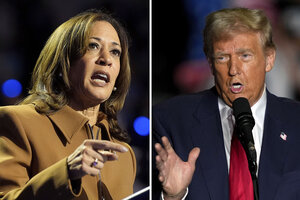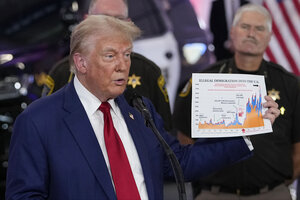Donald Trump will be the 47th president of the United States
| Washington
Four years after he was rebuked by voters and then fought until the bitter end to try to overturn his loss, former President Donald Trump is on his way back to the White House.
Mr. Trump was projected the winner in the key swing states of Pennsylvania, Georgia, North Carolina, and Wisconsin and was leading in all other swing states as he expanded his electoral coalition across the country – a decisive victory.
“America has given us an unprecedented and powerful mandate,” Mr. Trump declared in his victory speech early Wednesday morning.
It’s hard to overstate the scope of this political comeback – or the likely shift in direction for the United States that it signals. Mr. Trump will become just the second president in U.S. history to return to office after losing reelection – and the first since Grover Cleveland in 1892, more than a century ago. He’ll become the oldest president to enter office – he turned 78 in June and will be a few months older than President Joe Biden was when he was inaugurated in 2021.
Mr. Trump is also the first convicted felon to win the presidency, having been found guilty of 34 counts of falsifying business records related to hush-money payments to keep adult film star Stormy Daniels’ allegations of an affair under wraps. But that conviction and the three other criminal cases Mr. Trump faced – including two focused on his unsuccessful efforts to reverse his 2020 election loss – are likely to disappear now that he’s won another term.
The big question is what happens next. Mr. Trump has made pledges on a variety of issues, saying he’d slap a 60% tariff on Chinese imports, and possibly 100% on imports from Mexico. He’s promised to involve the US military in the “largest deportation operation in American history,” to arrest and expel the millions of unauthorized immigrants living in the U.S. Internationally, he’s long been a critic of NATO and some U.S. allies, as well as of U.S. support for Ukraine’s fight to push Russia from its territory, and may pressure Ukraine to accept less-than-favorable terms to end the war there.
He has also long promised to enact vengeance against those he accused of “lawfare” – including his political opponents, and the Democratic lawmakers who twice impeached him during his last term in office, as well as local prosecutors who charged him with crimes.
Votes are still being counted, but Mr. Trump may be well-positioned to move his legislative agenda and get who he wants confirmed to key roles in his administration. Mr. Trump heaped praise on Robert F. Kennedy Jr. in his Wednesday remarks, promising he was “going to help make America healthy again.” Republicans have already flipped control of the Senate; the only question now is how big the party’s majority will be, which will determine whether the handful of moderate GOP senators could block some nominees. He and his allies have been planning for years to make sure that he has loyal MAGA lieutenants for a second term in office.
Control of the House remains unclear and may not be known for some time. But Mr. Trump’s coattails may help them in that quest as well.
The race was remade in a chaotic few months over the summer. In late June, President Joe Biden delivered such a remarkably poor debate performance that Democrats began demanding he leave the race as he plummeted in the polls.
A few weeks later, while campaigning in Pennsylvania on the eve of the Republican National Convention, Mr. Trump narrowly survived an assassination attempt, when a gunman’s bullet nicked his ear. The subsequent convention had the feel of a race that was all but over, with multiple speakers saying his survival was miraculous and suggesting God had chosen him for the White House.
Just days later, however, Mr. Biden announced that he would drop his reelection bid – and endorsed Kamala Harris. She quickly made up the ground he’d lost in the polls, and for the last two months of the election, it appeared to be a coin-flip race.
For the third straight election cycle, Mr. Trump outperformed the polls, though their error wasn’t as large as the last two races.
Ms. Harris would have been the first woman, the first person of Indian descent, and just the second Black person to become president. But for the second time in eight years, Mr. Trump and his coalition made sure that the glass ceiling held.
At the macro level, the 2024 election looks a lot like 2016. Mr. Trump appeared on track to win the same states he won that year en route to the presidency. But while the country remains closely divided – and deeply polarized – the coalition Mr. Trump assembled was different from the one that carried him in a lower-turnout 2016 election.
Preliminary exit polls showed that while concerns about democracy were the top issue for a slight plurality of voters, the economy was the second-biggest issue – and two-thirds of voters said it’s in “bad shape,” following years of high inflation. Mr. Trump’s campaign worked hard to tie Ms. Harris to her boss and his handling of the economy, repeatedly slamming the “Biden-Harris” administration and attacking their economic record. The number of people who said they’re worse off than four years ago was 42% in exit polling – higher even than during the 2008 election, which happened during the middle of the economic crash known as the Great Recession.
That simple fact seemed to undercut all other issues – and especially hurt Ms. Harris with less affluent voters of all stripes.
The biggest shift of any demographic group appears to be among Hispanic Americans. Exit polls showed Mr. Trump winning 45% of the Hispanic vote nationally, which if accurate would be a high water mark for any Republican presidential candidate in more than a half-century. The only other Republican who has topped 40% of the Hispanic vote since the TV networks began conducting exit polls in 1972 was George W. Bush in 2004.
It would represent a 13-point jump from Mr. Trump’s own 2020 performance, and a full 17-point gain from his 2016 showing. The 2024 exit poll also found him winning an outright majority of the Hispanic male vote nationwide, the first time since the advent of exit polls that a Republican candidate has done so.
This election seems to have continued the growing education gap in voting as well. Mr. Trump reportedly won voters without a college degree by a 10-point margin, taking 54% of those voters, up four points from four years ago. Ms. Harris won 57% of voters with a college degree, with Mr. Trump’s share of those voters dropping three points from exit polls four years ago. More than 60% of U.S. adults do not have a college degree.
Mr. Trump also made clear inroads with Arab Americans and Muslims furious with the Biden administration for backing Israel in its wars in Gaza and Lebanon.
And Mr. Trump made significant gains in many blue states. In states where he keeps homes – blue New York and New Jersey as well as red Florida – he improved on his 2020 numbers significantly. And he gained votes in many diverse cities, including his old hometown of New York City.
Across the country, Mr. Trump performed even better overall in rural counties than his impressive showing in recent years, while holding his own or even gaining ground in the suburbs that had moved against him and the GOP in 2020 and recent midterm elections.
“We had everybody. And it was beautiful. It was a historic realignment, uniting citizens of all backgrounds around a common core of common sense,” Mr. Trump said in his speech.















